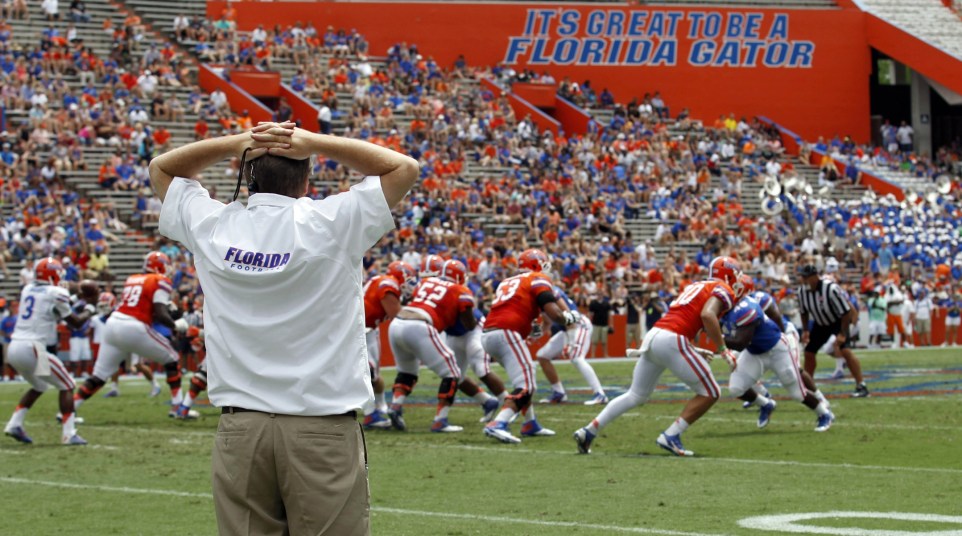Lack of offensive continuity will continue to haunt Florida in 2015
HOOVER, Ala. — Whether it’s a Fortune 500 company or a high-level football team, never-ending change isn’t ideal for elite performance.
The Florida Gators offense is a textbook example. The Jim McElwain-Doug Nussmeier tag team represents the fourth offensive coordinator in five years. Kenny Dixon II represents the seventh receivers coach in seven years.
More troublesome than the revolving office nameplates, Florida’s offensive philosophy has evolved from pro-style (Brent Pease) to up-tempo spread (Kurt Roper) and back to pro-style.
“You look at us getting off the bus now offensively, and it’s like the Land of Misfit Toys,” McElwain told ESPN in May. “They’re all different and recruited for different systems.”
Demarcus Robinson could make for a good approximation of Colorado State’s Rashard Higgins, at least from a production standpoint. Higgins, of course, finished behind Alabama’s Amari Cooper as a finalist in last year’s Biletnikoff Award voting.
But beyond Robinson, there aren’t any established talents at receiver. Brandon Powell, set to play in the slot, played mostly running back in his final high school season before splitting positional duties in ’14. Tight end Jake McGee, a smooth route-runner with good hands, caught 43 passes in ’13 before transferring to Florida and missing all of last season due to injury.
McElwain insists he doesn’t have an offense, instead designing every team based on personnel. But it’s clear Florida’s pieces may not fit together this fall. That extends to the offensive line and even quarterback, where Treon Harris (spread) and Will Grier (pro-style) possess different strengths.
“For us, it’s about trying to find out more so what they do well. Let’s fit what we’re trying to do — even though we know where we’re headed — what we’re trying to do in the now and help these guys be successful,” McElwain said at SEC Media Days.
“But let’s keep working on maybe some of the plots along the road to help us develop some continuity with what we’re doing. I think continuity is really a big word when you come out with four different offensive line coaches or whatever it’s been. That’s just the way it was and it’s up to us to find out what these guys can do well.”
Those are strong words from the new Gators coach, but his actions are a more telling barometer. Of Florida’s seven highest-rated commitments in the 2016 class, three are receivers and two are running backs.
The implication is clear: Florida must make do for now while it collects and develops cohesive pieces.
All else being equal, armchair psychology points to Grier as the likely starting quarterback. He could become a cornerstone once the team secures the cohesion McElwain covets. Rather than fret and obsess about this season’s results, Florida should and probably will use this season to determine if he’s the answer at quarterback for the next two or three years.
As much as McElwain insists he doesn’t have an offense, he won national championships as a coordinator at Alabama with pro-style quarterbacks Greg McElroy and AJ McCarron. At Colorado State, he patiently developed Garrett Grayson into a third-round pick. Grayson took 91 percent of his snaps from under center, according to RotoWorld.com, while shotgun snaps are a hallmark of the spread offense.
Powell and McGee are among the most talented offensive playmakers the Gators possess this season, and so McElwain and Nussmeier will try to manufacture points from a unit likely to evolve toward the usual vision for those coaches within the next two seasons.
The new regime is supposed to present the illusion, or at least the image, of permanence after so much desperate change. And that will be the case. But much like a new garden, the caretakers are going to have to do some watering, waiting and pulling of weeds before the soil starts to yield the good stuff.
Florida plays in the more favorable SEC division this year in the East. The defense is good enough to create plenty of close games. The team is as likely to be intimidating as it is to be embarrassing.
The Gators now enjoy a coaching staff that makes much more sense for the area’s recruiting landscape, the program’s history during its most successful stretches and the culture of today’s college football. There’s an offensive-minded coach who can attract great skill players and score touchdowns in bunches.
To Florida fans, hearing the word must sound like the wit’s end of a long water torture session. But there’s no question it will apply in 2015.
Patience.

